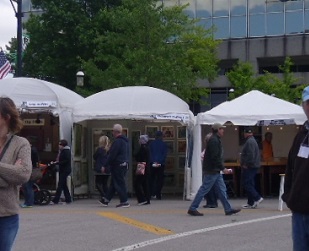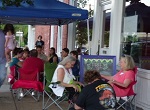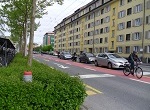A Temporary Use Permit Expands Zoning Flexibility
Last Updated: June 14, 2024
A temporary use permit is often allowed under a zoning ordinance, or perhaps through a free-standing municipal ordinance. The purpose is to allow a land use that would not otherwise comply with zoning requirements on a temporary basis.
Each city puts its own spin on the activities that require a
temporary use permit. Common land uses
that may require such a permit include festivals, sales and grand openings, auctions, art
shows, charity events, carnivals, construction offices and yards, model homes
that serve as sales centers in a subdivision, outdoor revival meetings, food
trucks, pop-up restaurants or crafts shops, produce stands, Christmas tree
stands, fireworks stands, camping for large festivals, car shows, and disaster
relief kiosks or offices.

Some cities, especially smaller ones, do not have a formal procedure for approving a temporary use permit. Sometimes the city essentially ignores the activity and does not enforce the zoning ordinance when an event will only last for a weekend, for example.
If there is a formal process for temporary uses, as there should be, the zoning ordinance should list the criteria for approval or disapproval of applications. Of course, it should provide for an approval process that is simpler than for a rezoning. Typical criteria for approval specify that nearby residents and businesses must be able to carry on normally, even if their normal traffic routes must be altered. The criteria may further be modified to cap noise levels and lighting levels, prohibit unusual glare or odors, or prohibit closure of streets or making parking spaces inaccessible, for example.
Often the zoning ordinance itself details the maximum
duration of a permit for each type of activity.
For example, a fireworks stand might be limited to two weeks in
duration, while a model home might be permitted until all lots are sold, all
but five lots are sold, or some such. A
construction yard might be limited to the actual time required for active
construction. Sidewalk sales might be
permitted for no more than three consecutive days.
These allowances should give ample time for set-up and tear-down prior to events. Some municipalities that like really detailed ordinance provisions will even give different amounts of set-up and tear-down time depending on the duration or complexity of the actual event.
The process for granting temporary use permits varies. Often these decisions are made by administrators on the basis of standards laid out in the zoning ordinance. In other cases, the planning and zoning commission or a particular city department or staff member must grant a temporary use that would be expected to last for a longer period of time. This might pertain to a subdivision model home that might be expected to be open for a year or two.
The ordinance may also prescribe a maximum square footage to be devoted to the temporary use, hours of operation, square footage of allowable signs, the exact location of the activity or elements of it (especially sound equipment or major lighting installations in the case of carnivals, concerts, and so forth), and any mitigation measures that might be required. For instance, if a Christmas tree stand is going to operate at night, it might be restricted in the types, location, and direction of lights in relation to a nearby residential area.
Again it is a best practice for a zoning ordinance to spell out the range of mitigation strategies that might be required, so as not to leave these decisions to the discretion of a single administrator. It's too easy for a staff member to be accused of negotiating conditions, which can lead in the U.S. to a lawsuit claiming administrative overreach and therefore some type of damages or even a payment for a taking of land.
Often conditions for a temporary use permit include the amount of parking that will be required, or conversely, parking requirements that will be waived.
Like most zoning regulations, it is appropriate to spell out the zoning districts where specific temporary uses may be appropriate. For instance, maybe you never allow a temporary use for an outdoor tent revival in a residential district, but such a use in a commercial or industrial district might make plenty of sense if particular conditions can be met.
The zoning ordinance also might spell out stances toward
tents, generators, sales of alcohol, or a range of other issues that might be
problematic for neighbors. Sometimes a
bond must be posted to cover any costs to the municipality before, during, or
after the event. For example, a carnival
or circus that does not clean up after itself could result in a considerable
expense for a municipal government or neighbors. A charity event that forgets to remove
permitted traffic barriers or a grand opening that leaves thousands of peanut
shells on the city-owned vacant lot next door can cause some scrambling the
next day.
Appropriate Policy on Temporary Use Permit Usage
Our thought about temporary uses is that a planning commission would do well to anticipate as many applications and complications as possible. Do not leave an administrator in the awkward position of having to tell a popular charity that the fiesta or rap concert cannot go on until midnight without any ordinance to back up this opinion.
We also think that a temporary use permit that recurs year after year may not be in the best interests of the community. We heard of a location that allows a six-month temporary use for farmworker housing that in no way meets any housing or existing property codes. Our opinion is that communities that allow such things are encouraging sub-human standards for housing and ignoring the fact that such housing would not be permitted under any other circumstances. If it's good enough for migrant farm workers, maybe it is good enough for others in the community who need inexpensive options.
Many recurring temporary uses seem to involve charity events. If a charity carnival can disrupt traffic and emit all manner of noise and traffic till 11 p.m. or midnight near a residential neighborhood, why couldn't a for-profit business? If temporary indeed means a very limited number of days, this type of action may be defensible, since we all may exceptions for our neighbors once in a while. However, something that happens for two weeks every year may be cause for review of what is permitted in a particular zoning district as of right.
Sometimes municipalities may grant temporary use permits in the hope that the temporary pop-up restaurant or business will become permanent. If this is the motivation for including temporary restaurants, for example, in a list of potential temporary use permits, why not consider zoning that allows the restaurant or particular type of shop? We are big fans of the pop-up business as a means of potentially proving a market, creating a market, or demonstrating acceptability, but there may be little reason to grant a pop-up where that type of business would not ordinarily be allowed by zoning.
A few locales even have set forth a process whereby what they call a conditional temporary use is designed to lead to a permanent use if a business is shown to be viable. If standards are not met, the temporary use expires. This seems unnecessarily complicated to administer to us; our advice is zone it or don't, unless you are thinking of a pop-up for a month or less where it will do no real harm. Even that duration is much too long, of course, if you suspect there will be a negative impact on a residential area. Maybe you could have a maximum of three evenings for a pop-up restaurant for charity purposes, or a maximum of two weeks for a show house for charity purposes.
Temporary uses can be quite beneficial if they give property owners or landlords much-needed income, raise the profile of an area in need of proving that they have a market, allow the community to enjoy a short-term fun event, or encourage innovative thinking and community vibrancy. No one would say that a large subdivision should not be able to have a model home or two or three, which essentially act as sales centers.
Overall, like all exceptions to ordinary zoning that
people seem to request over and over, a string of similar reasonable-seeming applications and
inquiries might be a good occasion for examining whether the zoning ordinance itself is too stringent and needs to be updated.
Related Pages for Further Reading
- Making and Keeping a Good Community >
- Zoning and Codes Temporary Use Permit
Join GOOD COMMUNITY PLUS, which provides you monthly with short features or tips about timely topics for neighborhoods, towns and cities, community organizations, and rural or small town environments. Unsubscribe any time. Give it a try.




